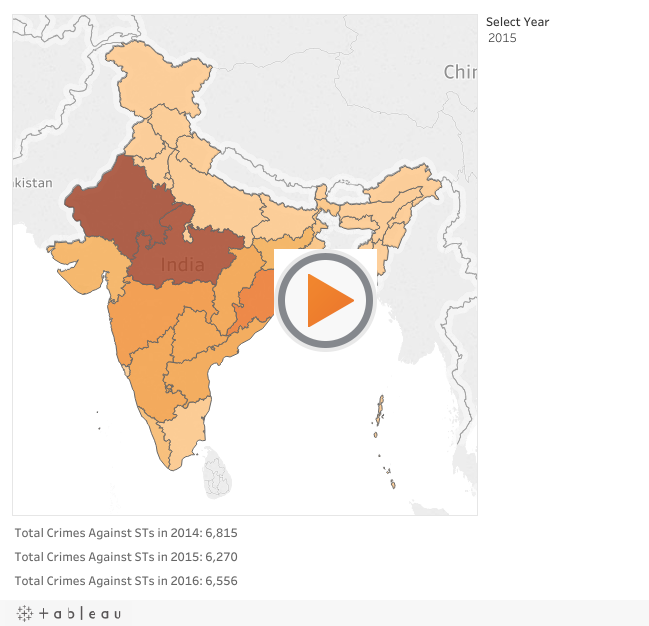Dilution of SC/ST Act and the Impact on Adivasis

Protection of the rights of vulnerable groups is perhaps one of the most important duties of a nation’s judiciary. With the recent Supreme Court directive diluting the SC/ST (Prevention of Atrocities) Act, the judiciary seems to be sending a message that it is not interested in performing this duty, and is effectively making it much more difficult for these marginalised groups to avail justice.
The court judgement seems to set the impression that crimes against Scheduled Castes and Tribes are no longer a big deal. What is more important is that any prosecution in “false” cases, however low their number may be, is prevented. But the number of atrocities against scheduled tribes have in no way gone down, as can be seen from the National Crime Record Bureau data from the last three years.
The judgement, meant to prevent misuse of the Act, chooses to look at the low conviction rates as the reasoning behind the changes. However, it ignores the low number of cases that are actually taken up and completed in an year. The 2016 NCRB data shows that out of over 18,000 cases pending in crimes against STs, trials were completed in only about 3,000 of them. With the new cases filed during the year, the total number of pending cases for 2017 went up to more than 20,000.
It also ignores the nature of the crimes that are recorded under this Act. Examples of police failing to register timely FIRs, carrying out shoddy investigations, harassing the victims reporting the crimes, and other systemic failures are a plenty. These factors significantly contribute to the conviction rate, which has been disregarded in the judgement.
Even if conviction rates is set as the chosen standard for judging the efficacy of a law, it is evident that the judges who wrote this judgement have chosen to target the SC/ST Act while ignoring many others with similarly low rates, some which are widely considered unconstitutional, such as the Unlawful Activities (Prevention) Act.
Sudha Bhardwaj, lawyer and civil rights activist who has been working in Chhattisgarh for over 25 years, pointed out the high number of cases in which adivasis are imprisoned, and after the passage of a few years, often acquitted. “Conviction rates being low has been equated by court to the innocence of the accused, and consequently that the complaint is malicious. Now if we look at the adivasi undertrials of Bastar, I can tell you that thousands and thousands of people have been acquitted after 3 years, 5 years, 7 years in jail. If the same logic is extended, then that means the security forces are filing malicious cases against adivasis,” she told Newsclick.
The judgement, passed by a bench comprising of Justice A.K. Goel and Justice U.U. Lalit, has made it mandatory for a government ‘sanction’ to be issued before any government official can be arrested under this Act. If the accused is not a public servant, an approval will be needed by the Senior Superintendent of Police (SSP). Another instance where prior government sanction is required before any legal action can be taken is in the cases of heavy-handedness by the Army in Jammu and Kashmir. But as records show, the government has failed to grant sanctions in most of those cases. Even the three cases that were allowed to proceed by the government have not been concluded. It is obvious that even now, the priority would be to shield public officials, not protection of rights.
The highest number of cases registered under the PoA Act are of crimes against women. In 2016, there were 835 cases of “Assault on ST women to outrage her modesty”, and 974 cases of rape. These numbers are markedly higher than any other offence registered under this Act. With the requirement of prior sanction, it will become even harder for women to come forward and file complaints. Within the already vulnerable groups, it is the even weaker section that will suffer. It should be remembered here that the same bench tried to pass a judgement last July to weaken the anti-dowry law by proposing setting up of “family welfare” committees for looking into dowry harassment complaints before any legal action. It was later decided that this proposal will be revisited at a later date by a larger SC bench.
Another notable aspect is that there are many cases where the authorities fail to even file cases under the atrocities Act. One example is the case of the sexual assault of minor girls in Palnar, Dantewada district of Chhattisgarh last year by CRPF men. During a Raksha Bandhan function in August, 2017, some girls complained that when they went to use the washroom, they were molested by CRPF men. The FIR registered for the complaint did not invoke the atrocities Act. No action was taken despite the girls being minor and adivasis.
In fact, the Act was strengthened by the previous government in 2014 as it was considered weak and insufficient for dealing with many kinds of commonly occurring atrocities. The list of offences under the Act was expanded to include tonsuring of head or moustache, garlanding with slippers, dedicating an SC/ST woman as a Devadasi, etc. These incidents were not considered offences prior to this amendment.
While misuse of the law is serious and it is important to protect innocents from being falsely implicated, the manner in which this bench has chosen to go about it raises a lot of problems as it undermines the basic protection granted to some of the most vulnerable sections of our population. As Bhardwaj said, “The Constitution has already said that it is constitutional to have positive discrimination. There is nothing illegal or unconstitutional or violative of article 14 or 21 if you have positive discrimination in favour of those are discriminated against. This positive discrimination has to be done, otherwise the conviction rates are going to be even lower in the courts.”
Get the latest reports & analysis with people's perspective on Protests, movements & deep analytical videos, discussions of the current affairs in your Telegram app. Subscribe to NewsClick's Telegram channel & get Real-Time updates on stories, as they get published on our website.


























